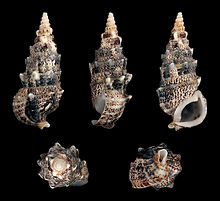Pseudovertagus aluco
| Pseudovertagus aluco | |
|---|---|

| |
| Five views of a shell of Pseudovertagus aluco | |
| Scientific classification | |
| Kingdom: | |
| Phylum: | |
| Class: | |
| (unranked): | |
| Superfamily: | |
| Family: | |
| Genus: | |
| Subgenus: | |
| Species: | P. aluco
|
| Binomial name | |
| Pseudovertagus aluco (Linnaeus, 1758)
| |
| Synonyms[1] | |
| |
Pseudovertagus aluco, common name aluco vertagus or Cuming's cerith, is a species of sea snail, a marine gastropod mollusk in the family Cerithiidae, the ceriths.[1][2]
Distribution
[edit]This species is present in the Indo-Pacific from the Eastern Africa to Philippines, and in Australia (Northern Territory, Queensland and Western Australia), the Samoan Islands and New Caledonia.[3][4]

Habitat
[edit]Pseudovertagus aluco can be found on sand-bars at the high tide level, on tidalflats, on clean sand and coralrubble.[5][6]
Description
[edit]Shell of Pseudovertagus aluco can reach a length of 45–95 millimetres (1.8–3.7 in).[3] This species possess high-spired shells with a small aperture and a few spiral rows of tubercles.
Behaviour
[edit]These sea snails usually extend their proboscis and foot deep into the sediments, rather than burrowing below the surface.[6]
References
[edit]- ^ a b Pseudovertagus aluco (Linnaeus, 1758). Retrieved through: World Register of Marine Species on 17 May 2010.
- ^ OBIS Indo-Pacific Molluscan Database
- ^ a b "Pseudovertagus aluco". Gastropods.com. Retrieved 12 January 2019.
- ^ Sealife Base
- ^ Walter Olivier Cernohorsky (1972). "The Taxonomy of Some Indo-Pacific Mollusca with Descriptions of New Species". Records of the Auckland Institute and Museum. 9: 195–204. ISSN 0067-0464. JSTOR 42906180. Wikidata Q58676917.
- ^ a b Jenny Sa ¨ lgeback and Enrico Savazzi Constructional morphology of cerithiform gastropods
- Linnaeus, C. 1758. Systemae naturae per regna tria naturae, secundum classes, ordines, genera, species, cum characteribus, differetiis, synonymis, locis.v. Holmiae : Laurentii Salvii 824 pp.
- Born, I. von 1778. Index rerum naturalium Musei Caesarei Vindobonensis, pl. 1, Testacea. – Verzeichniss etc. Illust. Vindobonae. Vienna : J.P. Krauss xlii 458 pp.
- Bruguière, M. 1792. Encyclopédie Méthodique ou par ordre de matières. Histoire naturelle des vers. Paris : Panckoucke Vol. 1 i–xviii, 757 pp.
- Adams, H. & Adams, A. 1854. The genera of Recent Mollusca arranged according to their organization. London : John Van Voorst Vol. 1(IX-XV) pp. 257–484, pls 33–60.
- Sowerby, G.B. 1855. Thesaurus Conchyliorum, or monographs of genera of shells. London : Sowerby Vol. 2(16) 847–899, pls 176–186.
- Kobelt, W. 1898. Die Gattung Cerithium Lam. 201–297, pls 37–47 in Küster, H.C., Martini, F.W. & Chemnitz, J.H. (eds). Systematisches Conchylien-Cabinet von Martini und Chemnitz. Nürnberg : Bauer & Raspe Vol. 1.
- Thiele, J. 1931. Handbuch der Systematischen Weichtierkunde. Jena : Gustav Fischer Vol. 2 pp. 377–778.
- Hirase, S. & Taki, I. 1951. A handbook of illustrated shells in natural colors from the Japanese Islands and adjacent territories. Tokyo : Bunkyokaku xxiv, 134 pp.
- Wilson, B.R. & Gillett, K. 1971. Australian Shells: illustrating and describing 600 species of marine gastropods found in Australian waters. Sydney : Reed Books 168 pp.
- Cernohorsky, W.O. 1972. The taxonomy of some Indo-Pacific Mollusca with descriptions of new species. Records of the Auckland Institute and Museum 9: 195–204
- Houbrick, R.S. 1978. The family Cerithiidae in the Indo-Pacific. Part I. The genera Rhinoclavis, Pseudovertagus and Clavocerithium. Monographs of Marine Mollusca 1: 1–130
- Wilson, B. 1993. Australian Marine Shells. Prosobranch Gastropods. Kallaroo, Western Australia : Odyssey Publishing Vol. 1 408 pp.
External links
[edit]- CERITHIIDAE
- Shell Encyclopedia
- "Pseudovertagus aluco". Gastropods.com. Retrieved 16 January 2019.
Bibliography
[edit]- Dautzenberg, Ph. (1929). Contribution à l'étude de la faune de Madagascar: Mollusca marina testacea. Faune des colonies françaises, III(fasc. 4). Société d'Editions géographiques, maritimes et coloniales: Paris. 321–636, plates IV-VII pp.
- Petit R.E. (2009) George Brettingham Sowerby, I, II & III: their conchological publications and molluscan taxa. Zootaxa 2189: 1–218.
